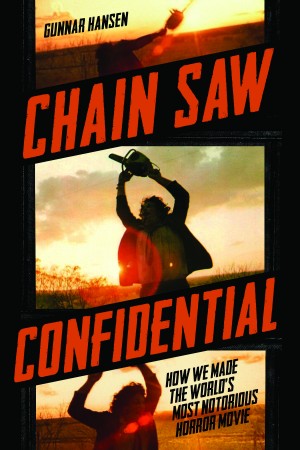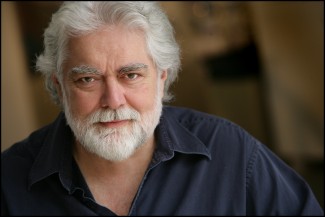GUNNAR HANSEN INTERVIEW: Leathrface pens book on iconic ‘Chain Saw’ role

Gunnar Hansen, the actor who portrayed the iconic Leatherface character in the original The Texas Chain Saw Massacre, has released a behind-the-scenes book about the memorable horror film. Chain Saw Confidential: How We Made the World’s Most Notorious Horror Movie chronicles the ups and downs of Tobe Hooper’s directorial effort and the legacy of the influential flick.
Recently Hollywood Soapbox exchanged emails with Hansen. Below is an excerpt from the book.
When did you come up with the idea to write Chain Saw Confidential? Why did you want to tell these stories?
I have been thinking off-and-on for many years about writing this book, but only recently decided it was time to do it. Before now, I had thought in terms of telling the story completely on personal terms — my experience of the filming. But once I started putting the idea together two years ago, I realized that I needed to tell the story as we all remembered it. So I decided to interview everyone from the movie that I could find. The reason to tell these stories was to address the endlessly expanding myths about the making of Chain Saw. So many people just did not know the story behind the movie.
When making The Texas Chain Saw Massacre, did you have any idea that it would become such an influential, groundbreaking film?
No. I don’t think any of us did. I think we all hoped it would be a good movie that would get some drive-in theatre play, but that was as far as our expectations went. By the time we finished shooting, some of us wondered if we even had a movie at all — could this footage be turned into a movie?

How did you approach the role of Leatherface? In your mind, did you play him as a villain, or did you go for a different approach?
The main challenge for me in creating Leatherface was figuring out how to portray him physically, since I would have no face or voice to work with. So I focused on that. As for playing him as a villain, no I did not. I didn’t think in that way at all. He is an ambiguous character in many ways — certainly in terms of whether he is evil. We see this evil in him, but he is also sympathetic, so we have some feeling for him. It is a crucial element of the movie — the family are the killers, the antagonists, but they are also, from a different perspective the protagonists — it is the kids who invade them and trespass into their house uninvited.
Were you shocked by the reaction to the movie and your performance? There were people who loved the film and people who were disgusted.
I was certainly a surprise, both by the movie’s popularity and by the hatred expressed by critics early on. The movie was hugely popular — far beyond our hopes — but at the same time, I could not understand the vehemence of the critics’ response. If they didn’t like it — and I had no reason to expect that they would — why not just ignore it? Why were they so shrill, so intent on disparaging the movie? I thought it was because it hit a nerve — it was hard to ignore.
With Chain Saw Confidential and the continued interest in Leatherface, why do you think your original character has lived on in the memories of audience members?
I think it is because Leatherface is morally ambiguous. Yes, he’s a monster — he is THE monster in the movie — but he is also a sympathetic character. The audience is pulled to him and is fascinated. He is real to them.
What can fans expect from you book signing events?
I will be talking about the process of writing the book and why I wrote it, as well as signing books for them. At some of the signings I will also be taking questions.
Would you ever revive the role of Leatherface if asked?
I don’t know whether I would. It was so long ago that I feel it would best to leave him alone.
By John Soltes / Publisher / John@HollywoodSoapbox.com

